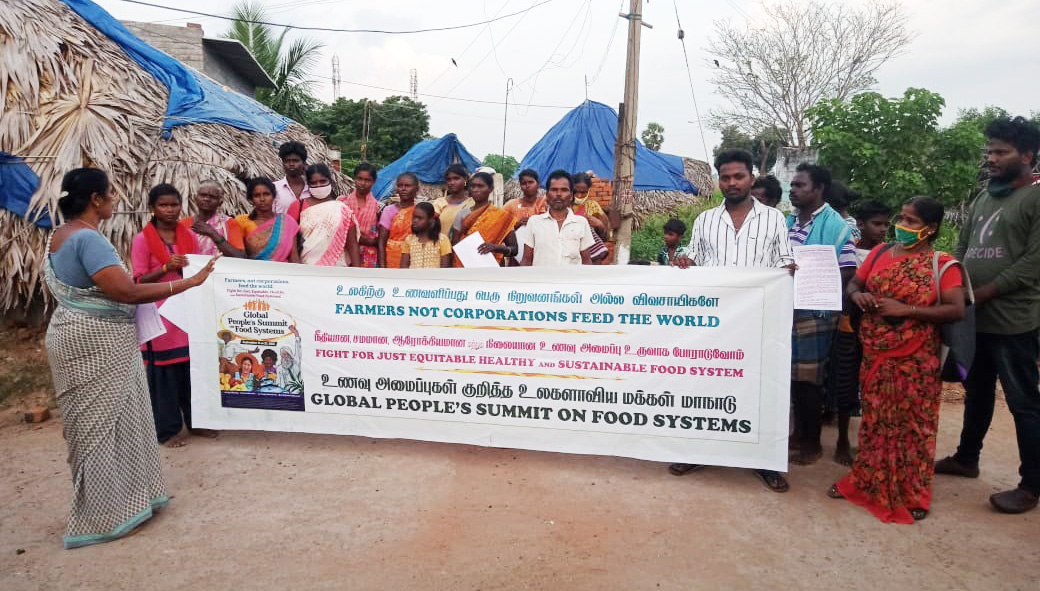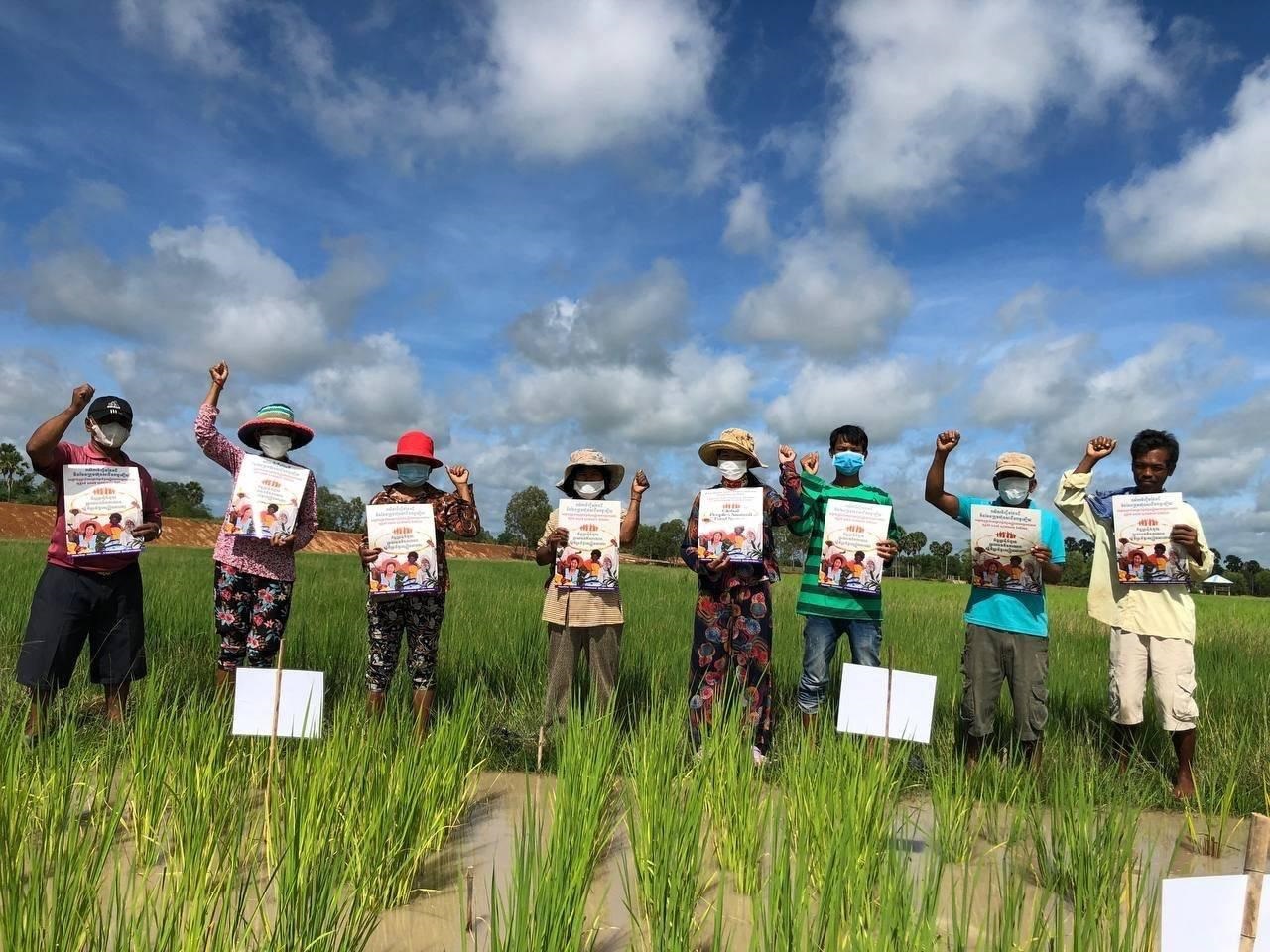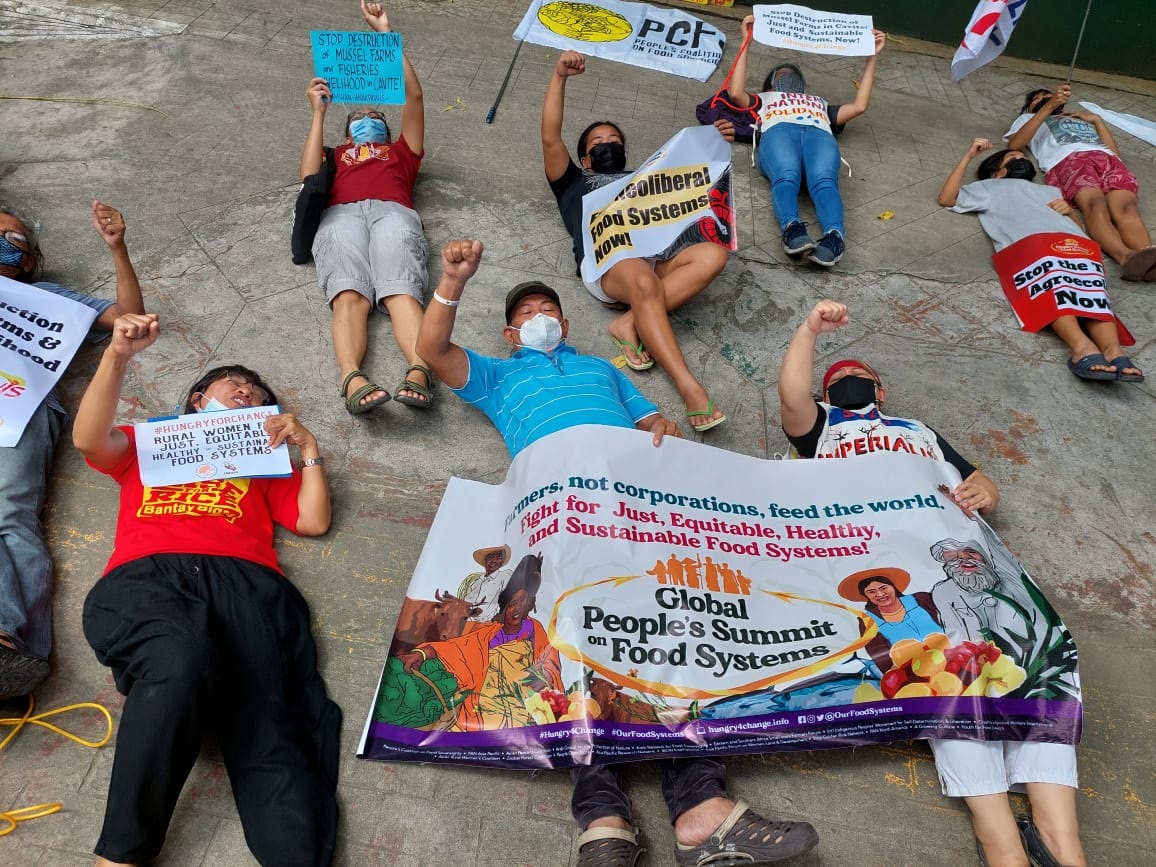As agribusiness firms around the world contribute to the worsening climate crisis amid their intensifying monopolisation of food, social movements and civil society organisations from around the world gathered for the Global People’s Summit for Just, Equitable, Healthy, and Sustainable Food Systems (GPS) to “resist the global corporate food empire.”
The people’s summit is the resounding response of peasant and advocacy groups to the UN Food Systems Summit (UNFSS). Twenty-two global and regional organisations led by the People’s Coalition on Food Sovereignty (PCFS) and PAN Asia Pacific (PANAP) organised the three-day event, which kicked off on September 21.
Held both virtually and on-ground in a series of webinars, workshops, and discussions, as well as live protests, the GPS highlighted the people’s demands for a radical transformation of food systems.
Building momentum
PANAP’s “No Land, No Life!” campaign and its partner organisations played a crucial role in building momentum for the GPS by organising various events and mobilising rural communities and advocates of people’s rights to land and resources.
Before the GPS in September, buildup activities tackled the issues, aspirations, and demands of various sectors, and created action plans to achieve their vision for just, equitable, healthy and sustainable food systems. In April, the Asian Peasant Coalition (APC), a co-organiser of the GPS, and PANAP’s No Land, No Life! campaign launched the Peasants Rise Up broadcast series. The PRU series became a venue to share and call attention to particular issues related to land and resources, livelihood, and human rights facing peasant communities in Asia.
On July 25 to 27, the GPS organised the #SiegetheSummit mobilisations to counter the pre-summit of the UNFSS. Various groups held public rallies in Manila, Jakarta, Phnom Penh, and Rome, where the UN pre-summit took place.

All in all, the GPS organisers and participating groups held more than 20 national (Cambodia, India, Indonesia, Pakistan, Philippines, and Sri Lanka, among others), sectoral (agricultural workers, fisheries, rural women, youth, and consumers), thematic (sustainable consumption and production, localisation of food systems, and genetic engineering), and regional (Africa, Latin America) workshops and fora in the months leading to the September people’s summit.
With preparations in full gear and benefitting from the numerous pre-summit discussions, the GPS proper began on a solid footing with participants composed mostly of small food producers, the real stakeholders in food systems transformation—in contrast to the UNFSS dominated by suit-clad billionaires.
Facing challenges of global food systems
On September 21, PANAP executive director Sarojeni Rengam officially opened the people’s summit. “Through the GPS, we were able to mobilise and work with old and new friends and allies who share our aspirations for food sovereignty, agroecology, genuine agrarian reform, and human rights; those who believe in the land to the tillers; those who reject monopoly control, plunder, and destruction of our natural resources for corporate profits,” said Rengam in her remarks.
The summit began with a communal dance video from women farmers in a community in Sumatra, Indonesia. The upbeat and fluid movements of Seruni (Indonesian Women’s Organisation) members impressed the participants as the community ended their presentation with a call to assert food sovereignty.
Afterwards, discussions on the challenges facing global food systems were held. The Consumers Union of Japan pointed out that gene-edited foods are a new frontier for corporations to monopolise food systems. Helena Norberg-Hodge of Local Futures echoed this sentiment, underscoring the effects of mass food production, monocultures, and pesticides on crop diversification and human health. “The global food system is a major cause of toxic chemicals and the insecurity of livelihood,” said Norberg-Hodge.
A short video on the life of a tea plantation worker in Sri Lanka underscored the marginalisation of women agricultural workers and the need for government action. Another video on Greek plantations highlighted the need for collaborative efforts for food self-sufficiency and agroecology.
Sylvia Mallari, global co-chairperson of PCFS, led a panel discussion on the initial outcomes of the UNFSS and their implications to food sovereignty. Mallari underscored the role of increasing food prices, the pandemic, and monopoly-controlled food systems in worsening global hunger and food security crises. The panel discussion concluded with a resolve to strengthen the campaign against neoliberal policies in food and agriculture that the UNFSS perpetuates.
Youth climate activists, including Greta Thunberg, also expressed their solidarity with the GPS via recorded video messages, highlighting the role of sustainable food systems in addressing the climate crisis.
Members of the peasant movement Pakistan Kissan Mazdoor Tehreek (PKMT) physically gathered in Karachi to join the GPS and express solidarity with farmers worldwide.
The Association Welfare Togo, Centre for Development Programmes in the Cordillera (CDPC) from the Philippines, and Aliansi Gerakan Reforma Agraria (AGRA) from Indonesia also talked about the current state of food systems in their countries, and stressed the need for farmers to control the means of production.
Wrapping up the first day of the GPS was a solemn memorial for both fallen and living peasant leaders and lands rights defenders worldwide, including the millions of Indian farmers staging the massive and historic protests against the neoliberal Three Farm Laws.
Pillars of transformation
The second and third days of the GPS further deepened the discussions and planning on the key pillars of food systems transformation.
PANAP, together with PAN North America and MASIPAG (a Philippine-based farmers-scientists network), organised a global workshop on “Transforming Food Systems through People-Led Agroecology.” The workshop reaffirmed the basic principles of agroecology from the perspective of small food producers and rural communities; provided updates on vital global discussions related to agroecology; identified challenges and potential areas of advocacy or campaigning; highlighted inspiring stories and best practices by communities advancing agroecology; and proposed initial action plans for food systems transformation through the lens of agroecology.
“Local Food First – Challenging the Techno-Trade Dogma,” organised by Local Futures, meanwhile, tackled the role of technology and the corporate food system in overtaking agricultural production. Azra Sayeed, director of Roots for Equity in Pakistan and chairperson of Asia Pacific Research Network (APRN), discussed the history of the World Trade Organisation (WTO) and its effects on small farms. In particular, Sayeed focused on the proliferation of genetically engineered seeds, the complexity of intellectual property rights and technical barriers faced by smallholders. On the other hand, Brazil-based researcher and climate negotiations analyst Camila Moreno highlighted the rise in power among technocrats and their firm control of food systems.
The PCFS-led workshop “Asserting Food Sovereignty, Transforming Food Systems” brought corporate control issues over agricultural lands to light. Land and resource grabbing and human rights violations against farmers and rural peoples were among the most prevalent concerns. Alongside these issues were shared stories of struggles and victories of communities asserting their food sovereignty. The workshop served as a venue to revisit the basic principles of people’s food sovereignty and how it challenges the corporate agenda in the UNFSS. It identified concrete action plans on how food sovereignty can be further advanced and drive the radical transformation of food systems through global and local campaigns.
Meanwhile, national summits on food systems in Indonesia, Malaysia, Philippines, and Sri Lanka tackled needed policy reforms at the national level.
Beyond the people’s summit
A Global Day of Action was held on September 23, the final day of the GPS and the official opening of the UN FSS. A protest action was held in front of the UN Headquarters in New York, where the UN FSS was taking place. In Manila, fisherfolk group Pamalakaya held a lie-in protest in front of the environment ministry. Meanwhile, the arrest of eight activists joining the Global Day of Action by the Indonesian police derailed the planned rally in Jakarta. Delegates of the GPS held a social media rally and pressed the Indonesian police to free the “Jakarta 8.” The inspiring display of global people’s solidarity eventually led the police to release the detained activists.


At the closing plenary of the GPS, the organisers and participating groups presented the various Action Plans produced by the different national, regional, sectoral, and thematic workshops, discussions, and consultations organised in the many months leading to the summit.
A key output of the GPS is the People’s Declaration, where civil society organisations (CSOs) and social movements from around the world outlined the people’s demands for food systems transformation. It was presented at the GPS plenary by Malcolm Guy, chairperson of the International League of People’s Struggles (ILPS).
The People’s Declaration expressed the commitment to struggle for just, equitable, healthy, and sustainable food systems. “We believe that sustainable food systems can only be built on the people’s right to a healthy planet and environment capable of adequately producing all the food needs of the world’s population. Building a solid foundation for sustainability in our food systems requires food sovereignty and agroecology, people’s rights to land and resources, decent working and living conditions, and a nutritious diet,” part of the Declaration read.
The People’s Declaration was subsequently endorsed by 566 groups from 78 countries, representing 45 global formations and 25 regional groups, and 496 national and local organisations worldwide.
The GPS concluded with a vow to work collectively to implement the Action Plans along the four pillars of food systems transformation, namely (1) Food sovereignty and democracy at the core of food and agricultural policies; (2) Agroecology and sustainability in production, distribution, and consumption; (3) People’s right to land, production, and resources; and (4) People’s right to adequate, safe, nutritious, and culturally appropriate food.
The struggle for the radical transformation of the world’s food systems does not end with the GPS. On the contrary, the people’s summit has laid out the path towards even more struggles to realise the people’s aspirations for a food system that truly protects the planet and serves the interests of majority of the world’s food producers, who continue to be marginalised and oppressed.
The challenges are certainly formidable, but as PANAP’s Rengam declared during the GPS, “We are the resistance, and we shall prevail!” ###














Discussion about this post